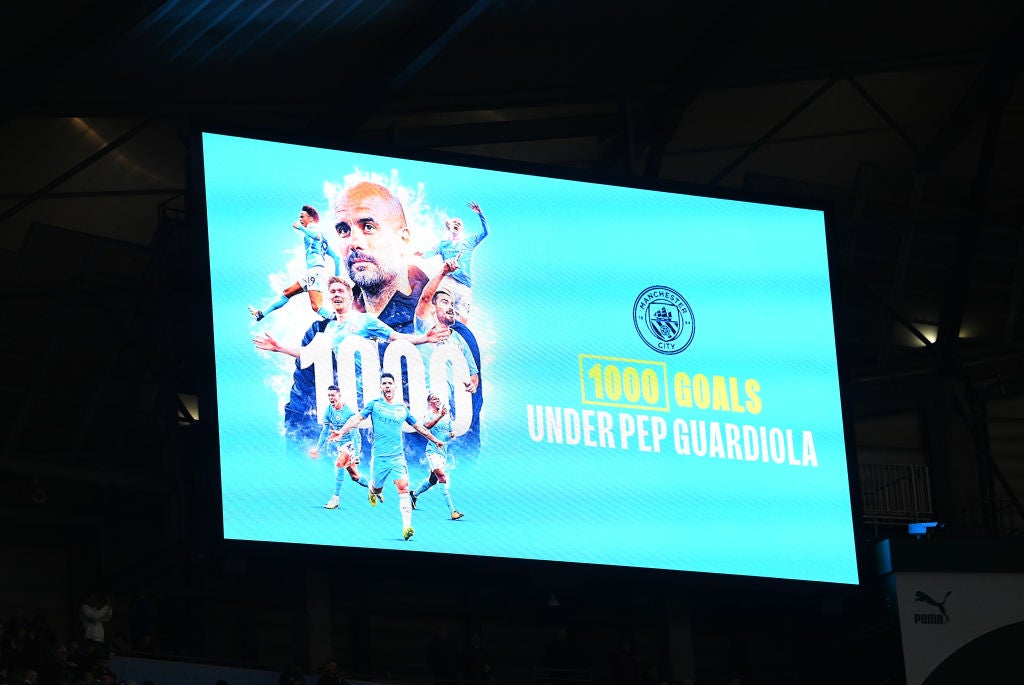How Pep Guardiola became the outlier who took football dominance to another level
The Manchester City manager has enjoyed considerable advantages in the Premier League, just like at Barcelona and Bayern Munich, but no manager has achieved more with them, writes Richard Jolly
Your support helps us to tell the story
From reproductive rights to climate change to Big Tech, The Independent is on the ground when the story is developing. Whether it's investigating the financials of Elon Musk's pro-Trump PAC or producing our latest documentary, 'The A Word', which shines a light on the American women fighting for reproductive rights, we know how important it is to parse out the facts from the messaging.
At such a critical moment in US history, we need reporters on the ground. Your donation allows us to keep sending journalists to speak to both sides of the story.
The Independent is trusted by Americans across the entire political spectrum. And unlike many other quality news outlets, we choose not to lock Americans out of our reporting and analysis with paywalls. We believe quality journalism should be available to everyone, paid for by those who can afford it.
Your support makes all the difference.Pep Guardiola was showing his playful side. Erling Haaland was not the only one at Manchester City who brought up a milestone. The tunnel comprised of teammates was formed, however, for the first player to score 35 goals in a Premier League season.
“I didn’t have the guard of honour today but maybe next time,” smiled Guardiola. Haaland’s 51st goal of the season had been Manchester City’s 999th under the Spaniard. It meant that Phil Foden’s deflected volley took their tally in his reign to 1,000. They have come in under seven seasons, at an average of over 140 per year. To put it another way, City’s 136 in the current campaign, high as it is, is still a few short of their normal haul.
“Unfortunately I didn’t score once,” reflected Guardiola. Which, as he is a 52-year-old former holding midfielder, is not entirely surprising. Guardiola the manager is a byword for goals; Guardiola the player never was. “The goals are the moment of pleasure so 1,000 times we enjoy it,” he added. It is 203 more than any other side in that period. “It is a lot of goals.”
It is for anyone; certainly for City who, famously, did not score at home after New Year’s Day in the 2006-07 season. Then their players got 37 in all competitions between them. Carry on at that rate and it would have taken Stuart Pearce’s side 27 seasons to reach 1,000. Or City could have rewound time to 1998: they returned to the top of the Premier League on the 25th anniversary of the day they scored five at Stoke but were relegated to the third tier anyway.
Different days, of course, and very different players. As he assessed Haaland’s haul, Guardiola considered the forward lines he, Manuel Pellegrini and Roberto Mancini have been able to call upon and said: “We cannot achieve many things without a good striker, this club had Sergio Aguero, a legend, and Gabriel [Jesus]. I was not here but [Edin] Dzeko, [Mario] Balotelli, [Carlos] Tevez: we cannot achieve if the club does not provide us with great strikers.”
The counterargument, of course, is that Guardiola could: he took teams with false nines to the title, he got goals from other positions.
Break down Guardiola’s 1,000 and Aguero provided the biggest contribution, with 124. Raheem Sterling almost overhauled him, getting 120 before his summer sale. There were 95 from Jesus while a host of attacking midfielders and wingers chipped in: 79 from Kevin De Bruyne, 78 from Riyad Mahrez, 59 from Foden, 54 from Ilkay Gundogan, 53 from Bernardo Silva and then 51 from the striker Haaland. Those six are very different players but there is a common denominator: each has had the most prolific season of his career under Guardiola.
It helps, of course, that each has been surrounded by similar talents, so a supply line has been superlative, that a team has had a propensity to run riot. Perhaps scoring the fifth and sixth goals in games matter less but a host of routs have helped City to this particular 1,000.

Numbers have been compiled by ratios. Haaland is scoring at over a goal a game under Guardiola, with 50 in 44. Aguero went at better than two in every three, Sterling at more than two in five. Mahrez’s ratio is better than one every three, De Bruyne’s better than one every four, and his assists far outnumber his goals. Silva and Gundogan are both scoring at more than a goal every six matches. And, in each case, they include substitute appearances.
Individual returns contribute to the collective record. Over seven years, City average 2.47 goals per game under Guardiola, with 1,000 in 404. Which, as his Barcelona team scored 2.58 per match and his Bayern Munich side 2.45, it suggests his methods are very transferable. In each case, he has had an advantage in the calibre of player and considerable resources. Asterisks can be attached for different reasons, whether the genius of Lionel Messi, Bayern’s habitual hegemony in the Bundesliga or the provenance of City’s funds. Yet across three clubs and 14 seasons, Guardiola’s teams have over 2,000 goals and are on course for an 11th league title points to a level of dominance rarely seen before.
It reflects a shift in football, where extreme talent is increasingly concentrated at a few clubs. But the extraordinary nature of it shows what an outlier Guardiola is.



Join our commenting forum
Join thought-provoking conversations, follow other Independent readers and see their replies
0Comments